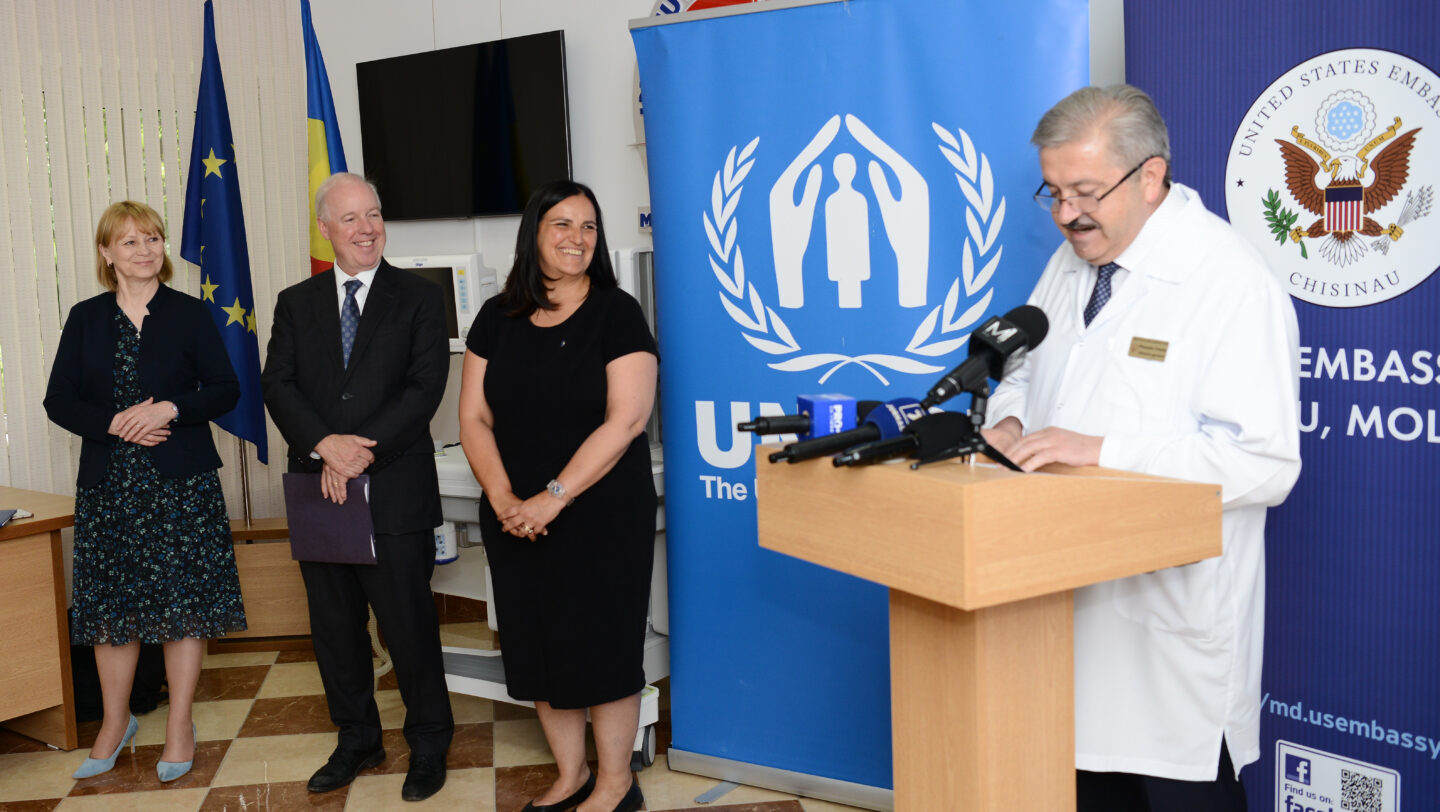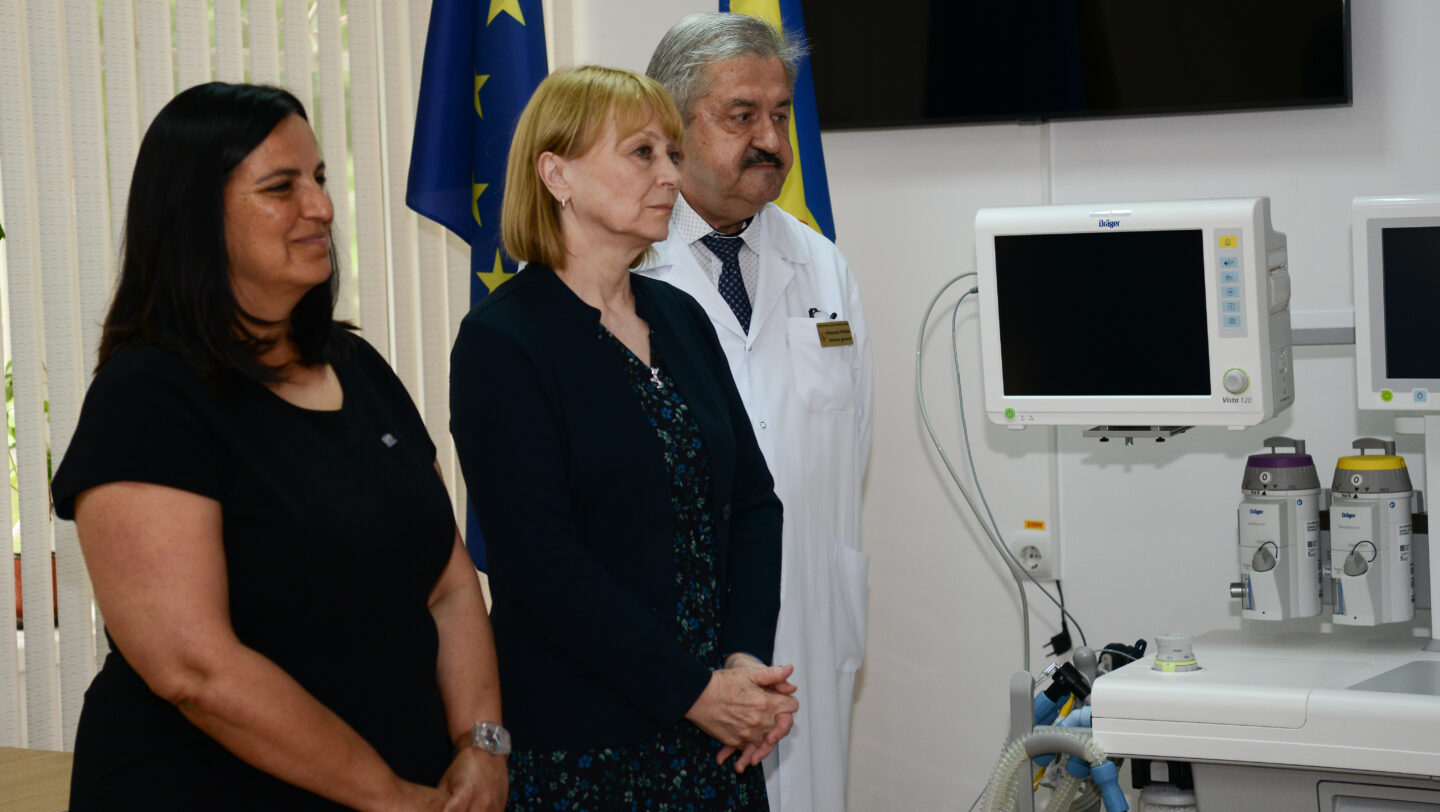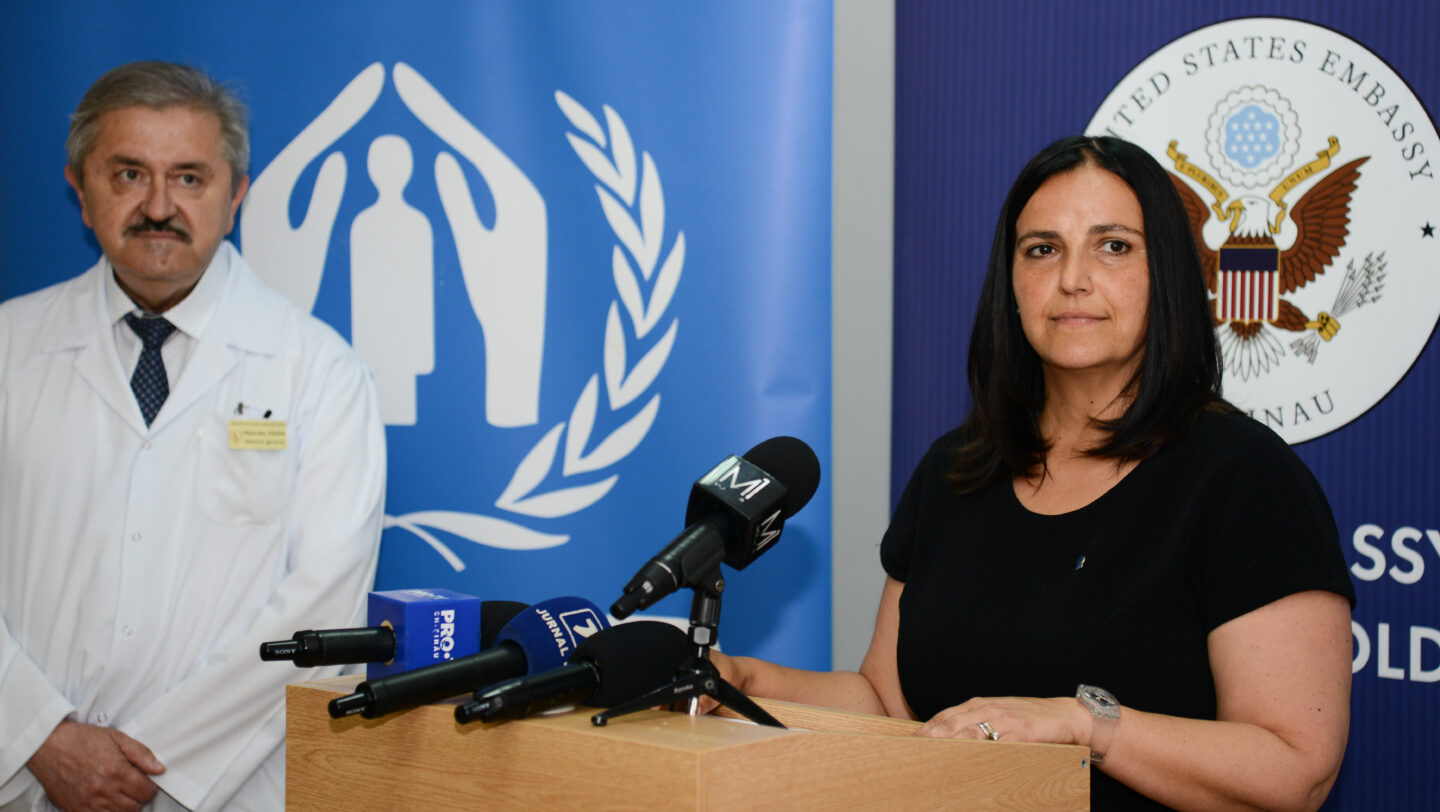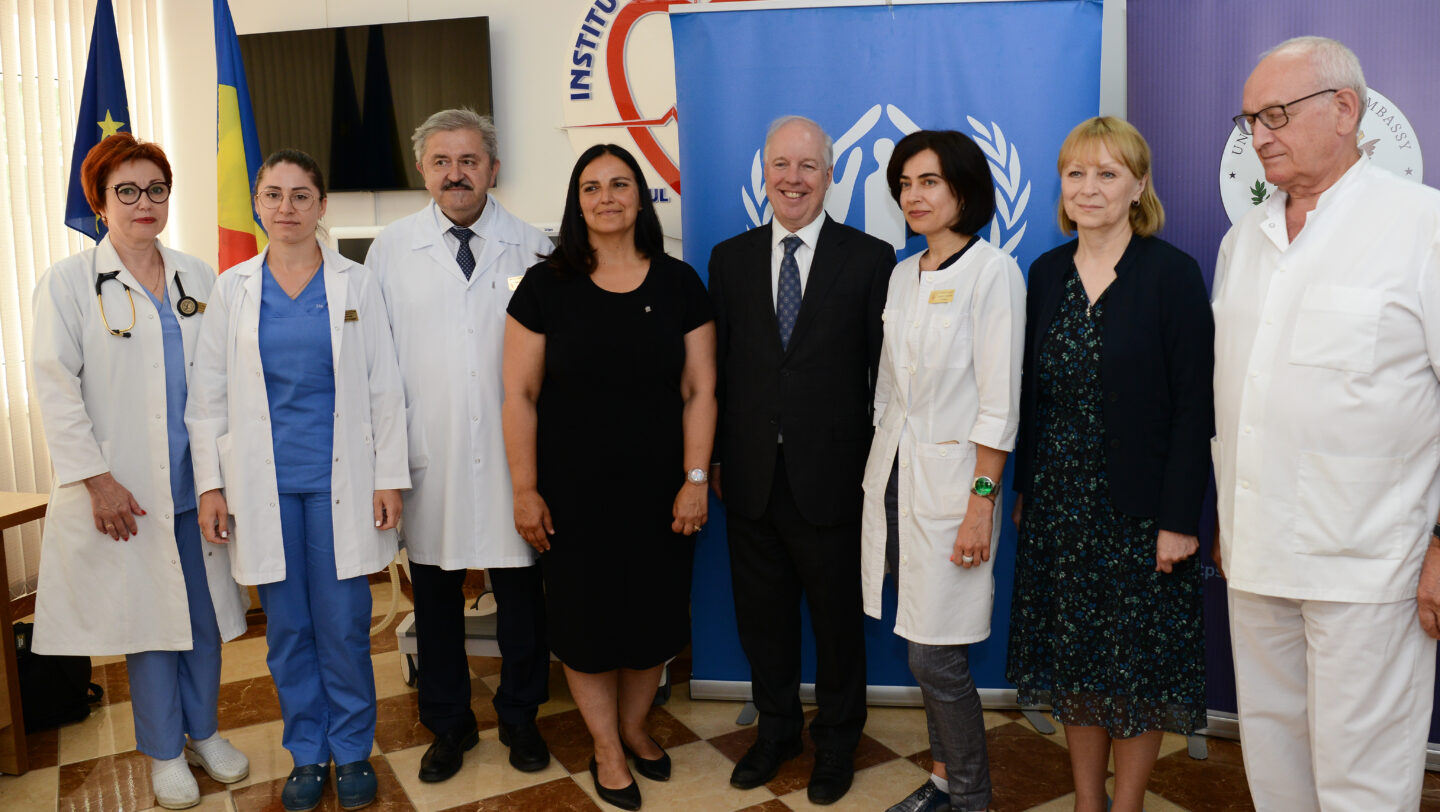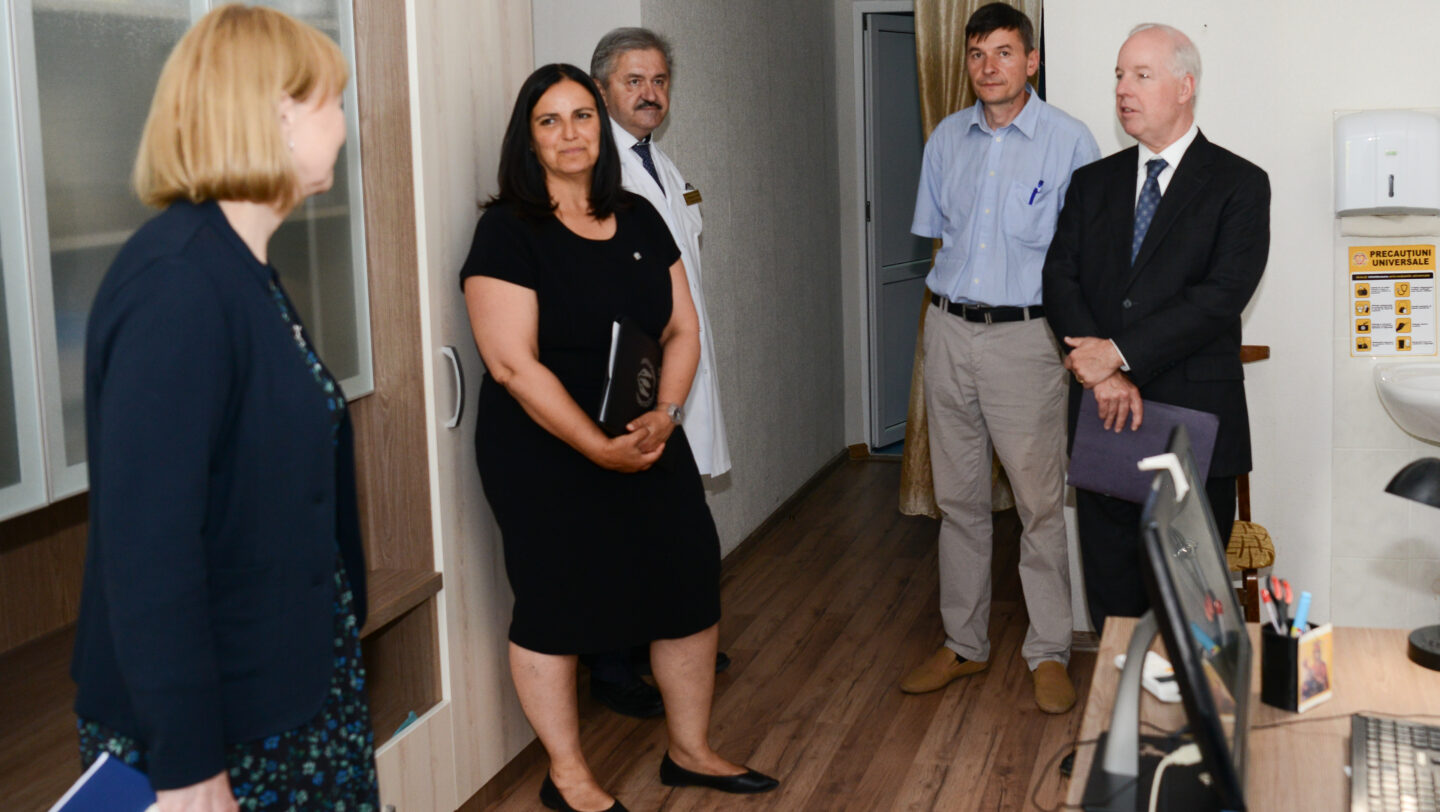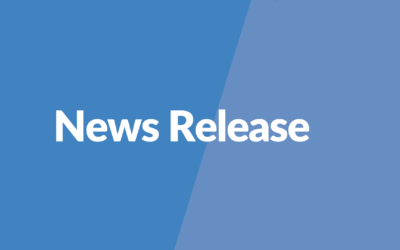UNHCR Provides 20 Local Hospitals in the Republic of Moldova with Anaesthesia Machines to Support Inclusive Healthcare
Chisinau, 20 June 2023 – UNHCR, the UN Refugee Agency, handed over 22 anaesthesia machines to local hospitals in the Republic of Moldova to improve access to healthcare for refugees and host communities. The machines have been distributed to hospitals across the raions (regions), where they will contribute to providing better and more inclusive healthcare for all.
This is just one element of UNHCR’s ongoing efforts to strengthen the overall national services that the people and Government of Moldova have generously made available and accessible for refugees.
“We are working together, hand in hand with our donors, and the Government of Moldova to strengthen the country’s protection and social services,” said Francesca Bonelli, UNHCR representative. ” Improving the quality of services available will benefit not only refugees but Moldovans as well.”
Moldova provides essential health services to refugees, including vaccinations, mental health support, and maternal and child health services on an equal basis as to Moldovans.“Moldova is committed to ensuring that our health system provides support and care for all, including refugees,” said Ala Nemerenco, Minister of Health of the Republic of Moldova. “To achieve this end, we need to work to ensure that our healthcare facilities are adequately equipped to provide quality healthcare services to everyone.”
The United States provides critical support to UNHCR, including to the refugee response in the Republic of Moldova. This vital support has helped strengthen national capacities to accommodate and provide services to refugees generously hosted by Moldova since the start of the conflict in Ukraine last year.
“The United States works closely with our international partners and local communities to provide healthcare to refugees in Moldova and the communities that host them,” said Kent Logsdon, United States Ambassador to the Republic of Moldova. “We are investing in Moldova’s future by supporting better, more inclusive healthcare.”
In March of this year, the Government of Moldova activated a temporary protection programme for refugees from Ukraine and their families. Temporary protection is a huge step forward in ensuring refugee inclusion in Moldova, including more stable access to legal status, rights, and services like healthcare.
Despite many pressing economic challenges and limited resources, Moldovans have opened their country and their homes to refugees. Over 822,000 Ukrainian refugees entered the country since the 24th of February 2022 and over 101,835 Ukrainian refugees remain, almost half of whom are children.
UNHCR is grateful for the support from our top government donors and for the generous contributions from individuals and the private sector.
European Union l France l Iceland l Italy l Japan l Denmark l the United States of America
UNHCR is also grateful for the support provided by donors who have contributed to global UNHCR programmes with broadly earmarked and unearmarked funds.
UNHCR and the Moldova State University sign a Memorandum of Understanding to Educate Students on Forced Displacement Issues and Refugee Advocacy
Chisinau, 11, April 2023 – UNHCR, the UN Refugee Agency and the Moldova State University (USM) signed a memorandum of understanding in which by it both parties solidify their commitment to educating students about the challenges of forced displacement and international refugee protection regime. UNHCR will support developing and offering an elective course, which would provide students with an opportunity to learn more about UNHCR’s mandate. Furthermore, UNHCR will avail opportunities for students to expand their skills and knowledge about refugees and humanitarian action through on-job and field training, given the students meet the agency’s eligibility criteria.
Strengthening students’ understanding of UNHCR’s mandate and forced displacement issues
Founded in 1946, The Moldova State University (USM) over time built an impeccable reputation at the national and international levels. Its creation constituted a basic pillar for the development and consolidation of higher education in the country. The Moldova State University represents the space where academic freedom is promoted. The university encourages pluralism of opinions, and creativity while ensuring quality higher education and research.
“We aim to equip future Moldovan professionals with the knowledge and skills to handle the pressing needs of refugees and to promote a more inclusive society. By working together, we can ensure that the rights and dignity of refugees are upheld, and their contributions to society are recognized and valued.” Igor Șarov, Rector of the Moldova State University “With the support of UNHCR students who study law, journalism, and social science can get in touch with over 75 years of accumulated knowledge and experience in working with refugees, and displaced people”.
Offering opportunities for training and internships
By offering these opportunities, UNHCR aims to increase the engagement of students with the needs of refugees and host communities, while also providing them with insights into pursuing careers in the humanitarian field. This initiative is vital in raising awareness and promoting advocacy for forced displacement issues.
“Since the start of the war in Ukraine, Moldovan people and Government are a great example of humanitarianism and solidarity with refugees and the most vulnerable,” Said Francesca Bonelli, UNHCR Representative “Such noble sentiments, combined with knowledge and skill is what the world and the humanitarian sector needs. This cooperation comes in line with the Global Compact on Refugees (GCR) and our commitment to contribute resources and expertise to enhance the quality and inclusiveness of the national educational system and facilitate access for refugee and host community students. I am looking forward to seeing more Moldovans working in international organizations, the UN, or becoming the future ambassadors of Moldova in the fields of human rights and development”.
This activity follows UNHCR’s commitment to supporting the Government of Moldova to strengthen its emergency preparedness and social protection capacities to ensure refugees’ safe and legal stay in the country.
End

UNHCR and the Moldova State University sign a Memorandum of Understanding to Educate Students on Forced Displacement Issues and Refugee Advocacy
Additional Information for Journalists
- The Republic of Moldova has received more refugees from Ukraine per capita than any other country worldwide: for every three Moldovan citizens, one person from Ukraine has arrived since the war began.
- As of 11 April 2023, out of the 800,096 arrivals, 100,058 Ukrainian refugees are currently hosted in Moldova, 60 per cent of whom are women and girls and 46% are children.
- Since the beginning of the refugee influx, UNHCR alone has delivered more than US$100 million worth of assistance and support in Moldova, in addition to the contributions of other humanitarian and development actors, as well as direct bilateral donor support to the Government.
Japan and UNHCR support the Association of People with Disabilities of the Republic of Moldova with valuable equipment
With the support of Japan, UNHCR, the UN refugee agency is providing the Association of People with Disabilities of the Republic of Moldova (AOSIRM) with equipment including two cars with wheelchair access, power generators, laptops, printers, and 200 hygiene kits for adults and children. This assistance helps increase the AOSIRM’s capacity to identify, reach, and support more people in need — both Moldovans and refugees alike. In this way, UNHCR’s community-based approach is designed to invest in partners like AOSIRM to sustainably support refugees, local communities, and people with disabilities.
The Association of People with Disabilities of the Republic of Moldova has a long history of advocating for more inclusive legislation, policies, and representation in governmental councils and commissions for people with disabilities. The Association also acts as the main hub for providing assistive equipment and aid for people in need. It serves not only to citizens of Moldova but also refugees from Ukraine, with UNHCR’s support.
“This equipment will encourage us even more in our planned activities to help refugees from Ukraine and our fellow citizens” Said Mihail Marginean, President of AOSIRM “Furthermore, it will improve our logistics and implementation of various planned projects. Our partnership with UNHCR helps to raise the capacity of our organization and helps us become stronger and more viable to the people that we serve”
Projects like this are guided by UNHCR’s rights-based approach to disability reflected in the UN Convention on the Rights of Persons with Disabilities, focusing on the meaningful engagement of persons with disabilities in all decisions that affect them.
“When Russia began their aggression against Ukraine, many people had to flee for their lives, and they were all vulnerable. It is easy to see that people with disabilities found it the most difficult to make the journey to safety,” said Yoichiro Yamada, Japan’s Ambassador to the Republic of Moldova. “The activities of UNHCR, together with those of the Republic of Moldova and its people, embody human conscience and compassion.”
With over USD 9M this year in contributions for UNHCR operation in the Republic of Moldova, Japan is one of UNHCR’s top donors and a key strategic ally in the refugee response in the country. The support of Japan enabled UNHCR to provide a wide range of assistance to refugees and vulnerable host communities in the Republic of Moldova. “Japan is an important partner for our investments in community capacity here in the Republic of Moldova,” said Francesca Bonelli, UNHCR Representative in the Republic of Moldova. “We continue to support groups like AOSIRM that work with both Moldovans and refugees with disabilities.”
Japan’s support for important global initiatives such as the Sustainable Development Goals, the Human Security and the humanitarian-development-peace nexus, unquestionably identifies it as a key supporter of refugees and displaced people.
UNHCR actively supports the critical role played by civil society in serving refugee and host communities.
The Republic of Moldova has received more refugees from Ukraine per capita than any other country worldwide: for every three Moldovan citizens, one person from Ukraine has arrived since the war began. As of the 21st of March 2023, out of the total 791,093 arrivals, 100,366 Ukrainian refugees are currently hosted in Moldova, 60 per cent of whom are women and 46% are children.

Japan and UNHCR support the Association of People with Disabilities of the Republic of Moldova with valuable equipment ©UNHCR/ Salahaldeen Abdulrahman
END
Broad humanitarian coalition launches joint 2023 plan to support the Republic of Moldova’s refugee response
03 March 2023
Chisinau. In response to the displacement crisis caused by Russia’s full- invasion of Ukraine, a broad coalition of humanitarian partners today launched the national chapter of the 2023 inter-agency Regional Refugee Response Plan (RRP). This plan, produced under the auspices of the Refugee Coordination Forum (RCF) co-led by the Government and UNHCR together with the UN family and humanitarian partners, appeals for sustained financial support to help refugees and host communities in this country.
In 2022, a total of 42 government and humanitarian partners joined the efforts to provide protection services and multi-sectoral humanitarian assistance to refugees from Ukraine, third-country nationals seeking safety and other persons in need, reaching some 128,000 people in the Republic of Moldova. The 2022 RRP complemented Government-led efforts building on the collective efforts being conducted by volunteer groups and other local responders. Notable achievements included reaching 108,000 individuals with cash assistance, 89,000 receiving in-kind assistance, supporting 128,000 with food assistance, providing protection services for 118,000 people, facilitating access to health services for 16,000, and ensuring 1,800 children are benefitting from the national education system.
“This national chapter of the Regional Refugee Response plan is the foundation of our Government’s collaboration with humanitarian partners in support of refugees from Ukraine and the communities that have received them in the Republic of Moldova,” explains Colonel Adrian Efros, head of the Government’s Joint Crisis Management Centre. “We are pleased to work with this broad coalition of partners from the national government, local authorities, United Nations, civil society, refugees, the diplomatic community and others to continue building upon what we achieved together last year.”
In 2023, a combination of 73 partners in Moldova will join their efforts to ensure protection, safety, and assistance continue to reach refugees and Moldovans alike. A key objective of the response plan is to provide coordinated support to government-led efforts to address the protection and lifesaving needs of refugees and those who fled the war in Ukraine. This will include the facilitation of appropriate solutions and support to Moldovan host communities.
“The world has watched with deep respect, as communities across Moldova opened their hearts and their homes to refugees fleeing Ukraine. The United Nations remains committed to supporting refugees and communities in Moldova” Said Simon Springett, the UN Resident Coordinator in the Republic of Moldova, “Through the Regional Refugees Response Plan this support continues – and will continue until the last refugee returns safely to Ukraine.”
Together, RRP partners seek USD $426.9 million to support a projected 1 million refugees that could potentially arrive in the Republic of Moldova by the end of the year. Since 24 February 2022, more than 775,000 refugees have entered Moldova and nearly 110,000, including third-country nationals, are currently in the country requiring mid to long-term support and solutions.
The RRP focuses on key sectors, including protection, basic needs, health and nutrition, education, livelihoods and inclusion, shelter, and cash assistance to refugees and refugees hosting families.
The plan is launched in the context of the ongoing war in neighboring Ukraine, that is characterized by attacks on non-combatants, civilian infrastructure, and ongoing large-scale displacement both within and outside of the country. It is also built as a continuation of the achievements of the previous year’s plan and the challenges raised during the implementation.
“Humanitarian needs remain high, which underscores the importance of international solidarity at this juncture,” said Francesca Bonelli, UNHCR Representative in the Republic of Moldova. “Together, we can sustain and continue to build upon the refugee response in this country for both refugees and host communities alike.”
In the context of the activation of the temporary protection regime in the Republic of Moldova, the promotion of resilience, livelihoods, and socioeconomic inclusion of refugees is a key aspect of the plan including the upgrade of local services, provision of socioeconomic integration support, job placement services, information, vocational training, validation, and certification of skills, as well as in-kind micro-grants for self-employment and small businesses.
Under the leadership of the Government of Moldova, the RRP brings together the efforts of 73 organizations including UN agencies, national and international NGOs, faith-based institutions, and civil society.

UNHCR/Salahaldeen Abdulrahman
End.
In Moldova, Religious Leaders call for increased support for refugees and host communities
Chisinau, 2 February
This week, the Government of the Republic of Moldova, Religions for Peace, and UNHCR, the UN Refugee Agency, hosted a delegation of leaders of the world’s diverse faith traditions, the Multi-Religious Council of Leaders. The delegation was welcomed by Minister of Culture Sergiu Prodan, local religious leaders and representatives from faith-based organizations involved in the refugee response, in a ‘Solidarity for Peace Dialogue’, featuring a roundtable discussion to bolster inter-religious support for refugees and their host communities in Moldova.
Forced displacement is a complex and growing crisis. By mid-2022, over 103 million people were forcibly displaced worldwide, with 74 per cent of them hosted in low- and middle-income countries. Responding to this crisis requires a whole-of-society approach as outlined in the Global Compact on Refugees, encompassing not only States and humanitarian organizations, but also religious leaders and faith-based organizations.
This initiative, bringing together international and local faith leaders as well as the Government and civil society to mobilize inter-religious support for refugees was the first of its kind. Faith leaders present encouraged their communities and faith-based organizations in their tireless provision of services and the promotion of inclusion and social cohesion in forced displacement contexts.
“Religions for Peace is committed to sharing the light of wisdom and compassion coming from each and all faith traditions. The strong belief is that when religions work together, no one is left behind”, said Prof. Azza Karam, Secretary General of Religions for Peace.
Despite challenges and limited resources of their own, Moldovans have shown remarkable humanity in welcoming almost 750,000 Ukrainian refugees since the invasion of Ukraine almost a year ago. Over 102,000 refugees currently remain, almost half of whom are children.
“As wars, conflict, and persecution continue to force people to flee their homes, we seek the support of faith leaders and their communities…We need a new commitment to solidarity with all refugees, no matter where they are coming from. The solidarity in Moldova is an important example for the rest of the world”, said Gillian Triggs, Assistant High Commissioner for Protection at UNHCR.
This initiative will support UNHCR in deepening its engagement with religious leaders to promote inclusion and social cohesion and better coordinate services for people who are forcibly displaced as well as the communities who receive them, enabling refugees and host communities alike to live more dignified lives, in line with the spirit of the Global Compact on Refugees.
For more information, please contact:
- In Moldova: Timothy Shoffner; [email protected]
- In Geneva: Louise Donovan; [email protected]
About UNHCR
UNHCR, the UN Refugee Agency, protects people forced to flee their homes because of conflict and persecution. We work in over 130 countries, protecting millions of people by responding with life-saving support, safeguarding fundamental human rights, and helping them build a better future. For more information, visit www.unhcr.org
About Religions for Peace
Religions for Peace comprises 90 national and six regional Inter-Religious Platforms, provides direct, multi-religious humanitarian support, and mobilises faith communities across the globe to welcome migrants and refugees, For more information, visit www.rfp.org
The United States and UNHCR support the Republic of Moldova’s General Police Inspectorate in increasing its mobility capacity
Chisinau, Moldova 13 January 2023: The United States of America and UNHCR, the UN Refugee Agency, today handed over 32 vehicles to the Ministry of Internal Affairs of the Republic of Moldova to strengthen the government’s capacity to respond to the ongoing refugee emergency.
Since the war began in Ukraine, the Ministry of Internal Affairs has mobilized its workforce to receive refugees efficiently, safely and humanely, while maintaining their normal duties serving the people of Moldova. To increase the General Police Inspectorate’s mobility and monitoring capacity, the generous support of the United States of America allowed UNHCR to provide 32 vehicles to the General Police Inspectorate.
“The Ministry continues to work on improving the working conditions of subdivision and employees, which will result in better service and protection for the people of Moldova and refugees residing in the country. We appreciate the support from our international partners”, said Ana Revenco, Minister of Internal Affairs.
The United States has been supporting the humanitarian response to the refugee situation in Moldova through the efforts of the United Nations and UNHCR.
“The United States is committed to partnering with the people and the government of Moldova to address immediate challenges and build a democratic, prosperous, and secure future. These vehicles are only our latest demonstration of that commitment,” said Ambassador of the United States Kent Logsdon.
UNHCR is supporting the Government of Moldova to strengthen its emergency preparedness and social protection capacities to ensure the safe and legal stay of refugees in the country.
“Ensuring that both refugees and local communities get the help they need is our top priority,” said Francesca Bonelli UNHCR Representative in Moldova. “The United States provides essential support to this work. We are grateful for this concrete show of solidarity with the Moldovan people and the refugees they have received so warmly here.”
Since March 2022, the Republic of Moldova has received over 667,913 arrivals and currently hosts over 102,016 refugees from Ukraine. A substantial number of those who remain in Moldova are women, children, and elderly refugees.  ©UNHCR/ S Abdulrahman
©UNHCR/ S Abdulrahman
UNHCR is grateful to the Government of Japan for their contribution for Ukrainian Refugees in the Republic of Moldova
UNHCR, the United Nations Refugee Agency warmly welcomes a contribution of USD 9,106,462 from the Government of Japan for crucial humanitarian assistance to Ukrainian refugees and host communities in the Republic of Moldova.
The people of Japan’s generous contribution strengthens the operational capacity of UNHCR and its partners to reinforce support to the Government of the Republic of Moldova to implement the Temporary Protection regime, support refugee inclusion, and help host communities. This support includes technical protection expertise and building registration capacity for temporary protection, strengthening asylum and refugee status determination procedures, support for opening community service centres around the country that serve refugees and Moldovans alike, employment counselling, and other important services. In addition, this valuable support will help enable the national protection system and civil society actors to prevent, mitigate, and respond to gender-based violence (GBV) and sexual exploitation/abuse (SEA).
“Japan has been an essential partner to UNHCR across the globe and particularly in Moldova during the past months,” notes Francesca Bonelli, UNHCR’s Country Representative for the Republic of Moldova. “This support comes at a key juncture of the refugee response and marks a concrete manifestation of international solidarity with refugees and host communities here.”
Another notable outcome of Japan’s contribution is enhanced identification and referral of persons with specific needs to appropriate services — including children, women, persons with disabilities, older persons, as well as survivors and those at risk of gender-based violence (GBV) and/or human trafficking. It will expand the capacity of service-providers and support educational and recreational activities for Ukrainian refugee children enrolled in schools.
“It’s a tragedy that so many Ukrainians had had to flee from their country for safety and experience all kinds of difficulties since the beginning of the war. At this difficult time, we are deeply impressed by the generosity of the Moldovans who provide shelter to the refugees despite the economic difficulties of their own. I hope that the latest contribution from Japan through UNHCR will help address the huge needs.” said H.E. Mr. Yamada Yoichiro, Ambassador Extraordinary and Plenipotentiary of Japan to the Republic of Moldova
The Republic of Moldova has received more Ukrainian refugees per capita than any other country worldwide: for every three Moldovan citizens, one person from Ukraine has arrived since the war began. As of the 1st of January 2023, out of the total 739,467 arrivals, 102,103 Ukrainian refugees are currently hosted in Moldova, 84 percent of whom are women and children
UNHCR Moldova has been supporting government-led efforts to provide protection and support to refugees since establishing a presence in the country in 1997. UNHCR significantly expanded its operations in the country in late February in response to the influx of refugees from Ukraine to co-lead the interagency humanitarian response aligned with the Regional Response Plan (RRP) for the Ukraine Situation.
In 2022, Japan ranked as UNHCR’s 4th largest government donor with its contribution of USD 164 million, making it one of UNHCR’s top donors.
UNHCR will continue to support the Republic of Moldova in managing the refugee crisis
(Unofficial Translation)
(Guvernul Republicii Moldova) The measures taken by the national authorities to manage the refugee crisis and the actions planned for next year in order to support the Ukrainian citizens who are on the territory of the Republic of Moldova due to the war were discussed at the meeting of Prime Minister Natalia Gavrilița with the representative of the UN Refugee Agency (UNHCR) in the Republic of Moldova, Francesca Bonelli.
The Prime Minister appreciated UNHCR’s support, which increased the Government’s response capacity and contributed to the development of effective mechanisms through which both Ukrainian refugees and their host families and communities can benefit from aid. The Prime Minister praised the unity and hospitality of the people of the Republic of Moldova, which mobilized to provide the Ukrainians with the necessary support.
“The solidarity shown by our people has changed the image of the Republic of Moldova throughout the world. At the same time, external partners, taking into account our limited resources, helped us to face the challenges and support the families who hosted Ukrainian citizens. It is admirable that we have all organized ourselves in such a way as to manage this crisis in a professional way”, said Natalia Gavrilița.
For her part, Francesca Bonelli thanked the government team for the work done and the openness to solving the problems related to the large flow of refugees: “The effort made by the Government during this period is incredible. Thanks to the involvement of the state institutions, but also of the citizens who reacted promptly and with a lot of empathy, Moldova has become a global example in the management of this crisis”.
The parties exchanged views on the cooperation framework for the next period. According to the prime minister, among the priorities are the expansion of temporary protection for refugees from Ukraine and the inclusion of refugee children in the school environment. In this sense, a series of Romanian language courses will be organized for children and adults, as well as support actions for educational institutions that also cover the refugee component.
Currently, over 7,800,000 people have left the territory of Ukraine, of which about 726,000 have transited to the Republic of Moldova. Currently, there are about 88,000 Ukrainian citizens on the territory of our country.
MINISTRY OF LABOUR AND SOCIAL PROTECTION AND UN AGENCIES JOIN HANDS TO SUPPORT THE REPUBLIC OF MOLDOVA SOCIAL PROTECTION SYSTEM
25 of November 2022, CHIȘINĂU – The United Nations Population Fund (UNFPA), UN Refugee Agency (UNHCR), International Children’s Emergency Fund (UNICEF), International Organization for Migration (IOM) and World Food Programme (WFP) have signed a Memorandum of Understanding with the Ministry of Labour and Social Protection to provide emergency cash assistance to crisis-affected populations and integrate shock response into the national social protection system in the Republic of Moldova. This programme is the first of its kind at its scale in Moldova, enabling a holistic and inclusive approach that will enable communities to become more shock resistant.
The programme was officially launched on the 25th of November with the Minister of Labour and Social Protection, Marcel Spatari; UN Resident Coordinator, Simon Springett; and the Heads of the UN Missions: Nigina Abaszada for UNFPA; Francesca Bonelli for UNHCR; Maha Damaj for UNICEF; Lars Lonnback for IOM; and Jonathan Campbell for WFP.
“This joint project shows international solidarity with Moldova and its people; these international funds complement government assistance programs and will allow us to make cash transfers to 40,000 of the most vulnerable families affected by the increase in energy and food prices that are worrying so many households. It will also allow us to have technical support to meet the additional demands brought by the current situation”, stated the Minister of Labour and Social Protection, Marcel Spatari.
UN Resident Coordinator, Simon Springett noted that “We all feel the enormity of responsibility to support citizens and communities amidst the current and likely prolonged period of uncertainty and instability and to ensure that no one is left behind. From the beginning, the UN in Moldova was committed to a joint coordinated response that complements the refugee emergency response with development interventions addressing the impacts of the socio-economic crises”.
“The eligibility criteria for the programme were established through a mutual agreement between the UN agencies and the Ministry of Labour and Social Protection. The eligible families will benefit from MDL 700 financial aid monthly in the next 6 months. The selection will be done through the already existing “Ajutor Social” and “APRA” systems”, said Jonathan Campbell, Emergency Coordinator of WFP Moldova.
Factors deciding family eligibility for this assistance include families already selected for Ajutor Social or APRA; whether any family member has a degree of disability; the family consists of a single parent with children aged between 0-17; families with at least 3 children aged 0-17; families with pregnant or breastfeeding women with at least one child between the ages of 0-2.
“While the people of Moldova have shown unstinting solidarity by hosting the large number of refugees, this has squeezed existing resources and coping mechanisms of ordinary families. In order to sustain social cohesion among communities, we must not forget about the children in Moldova, who are the most vulnerable collateral victims of the war in Ukraine and who must always be protected” said Maha Damaj, UNICEF Country Representative.
“UNFPA prioritises the special needs of pregnant and lactating women who face multiple levels of vulnerability during times of crisis. It is important that this programme will increase the access of women and girls to services. There is robust evidence that cash assistance to pregnant and lactating women increase their service utilisation for earlier and more frequent antenatal care and skilled birth attendance, which has a direct impact on improving maternal health outcomes” said Nigina Abaszada, UNFPA Resident Representative
UNHCR Country Representative Francesca Bonelli emphasised that “the people and Government of this country have set a global example in how they have received refugees from Ukraine – and the MoU signed recently for the programme is one way for the international community to share that responsibility. UN support for Moldova’s social protection systems means that more Moldovans and refugees will get help when they need it.”
“IOM’s contribution to emergency cash provision for vulnerable Moldovans during this challenging winter will enable even more Moldovan families in need to receive much needed support. By joining hands with our UN partners and under the leadership of the Ministry of Labour and Social Protection, we are reaching out to people in need this winter: not only to vulnerable refugees who have fled the war in Ukraine, but also, through this project and others, to vulnerable Moldovans who would otherwise struggle during the cold months. We are all in this together. Beyond the winter, we will continue our support to the Government of the Republic of Moldova and its social protection mechanisms to ensure they are robust and can support all vulnerable people in the country”, stated Lars Johan Lönnback, Chief of Mission, IOM Moldova
Thanks to the generous support of donors to the above-mentioned UN agencies, this programme will reach vulnerable Moldovans throughout the Republic with financial support to help meet their essential needs over the winter.
# # #
The UN agencies UNFPA, UNHCR, UNICEF, IOM and WFP, involved in the programme, have a mandate that integrates humanitarian interventions with government social protection system-strengthening, and have extensive global experience in contexts of fragility, displacement and conflict. Their experience in providing cash transfers in emergencies, emergency preparedness and shock-responsive social protection, and expertise in refugee and forced displacement crises make the agencies well placed to work effectively with governments and partners to assist vulnerable families and to ensure better preparedness to respond to shocks.
For more information, please contact us on the following email addresses and phone numbers:
For MLSP: Diana Blanaru, Head of Communications Department; +37369750710; [email protected]
For UNFPA: Ene Tuyliyeva, Communications Analyst, +37360246241; [email protected]
For UNHCR: Irina Odobescu, Communications Associate; +37369166030; [email protected]
For UNICEF: Angela Munteanu, Communications Officer; +37369123630; [email protected]
For IOM: Riccardo Severi, Communication and Information Officer; +37360407660; [email protected]
For WFP: Daniela Oleinic, Communications Associate; +373 68302207; [email protected]


